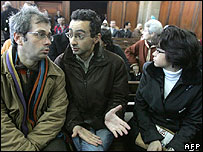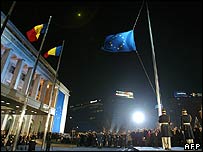
The BBC reported on an interesting case today from Morocco. Two journalists, Driss Ksikes and Sanaa al-Aji, have been handed sentences of three years for defaming Islam and breaching public morality. The court also banned publication of their magazine for two months and fined them about $8,000.
The two journalists had written an article entitled How Moroccans laugh at religion, sex and politics. The article had featured jokes about God, the prophets and the Moroccan king. The journalists claimed they did not invent the joke about Islam but rather used something that was already in general circulation.
So here's an interesting case study:
From the journalists point of view: they have newly-won press freedom which has been been swept away by this verdict. They claimed to make jokes was not something to be ashamed of, that making jokes did not in any way contradict with religion as there is a time for laughter and a time for seriousness, and that they were merely recording the jokes rather than inventing them. Laughter above all things, should not be suppressed as it allows a society to express itself. The journalists are backed by many international organisations and intend to appeal their sentances.
From the judges point of view: Morocco is new to freedom of press and it is fragile - therefore the prosecution argued that that there must be limits to freedom of speech, i.e that some things are better left unsaid as a mark of respect. The jokes, they claimed, deeply insulted many ordinary Moroccans and their religion. Moreover in the Koran it says there should be no image or personification of Allah and the jokes were doing just that. So the prosecution argued for Islamic traditions to be upheld and as it was, it recieved the backing of most of the Arab world.
Its interesting that one might side differently with a case such as this in Morocco compared to if such a case arose in England. In Morocco , since freedom of speech is still developing and could be so easily taken away, i would say the journalists were perhaps a bit reckless in using this joke. Even if laughter and jokes are more permissable, perhaps printed in a magazine isn't the most subtle thing to do. But then perhaps they were making a point that things had to improve more! But if this happened in England......................I wonder what would happen. One only needs to remember the cartoons published in Europe last year to imagine that if such a case arose, the outcome might be similar, except dressed up in a different wording.
Morocco - no tolerance for any religion except Islam, therefore don't mock/criticise
England - supposed tolerance for all religions, therefore don't mock/criticism

